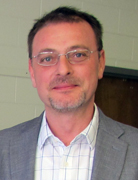UConn engineers receive a number of awards; here’s a selection of honors our faculty and students recently received.
The Connecticut Transportation Safety Research Center and the Connecticut Department of Transportation has received national recognition for its state of the art motor vehicle crash reporting system and development of the Connecticut Crash Data Repository. On August 31, 2016, representatives from CTDOT and UCONN CTSRC attended the Governors Highway Safety Association (GHSA) annual meeting to accept the Peter K. O’Rourke Special Achievement Award in the Field of Highway Safety.
The CTDOT in partnership with the CTSRC collaborated on a landmark effort to improve the quality and accessibility of the state’s crash data. “Our previous crash reporting system, which met the needs of earlier generations of state and local safety planners, was in need of being overhauled and replaced. We capitalized on the opportunity, collaborated, and produced a state-of-the-art system that enhances our ability to collect, analyze and most effectively utilize timely, complete and accurate crash data,” said DOT Commissioner James P. Redeker. “This partnership demonstrated that a multi-disciplinary interagency project team is an effective model for expediting project delivery.”
Professor S. Pamir Alpay, UConn material science and engineering department head, presented a lecture on “Accelerating Materials Deployment and Manufacturing via Multi-Scale Modeling and Genomics” at the 40th year celebration of the Korea Institute of Machinery and Materials, or KIMM, in Daejeon, South Korea August 18.
For its third year at South Korea’s KIMM, the International Forum on Advances in Mechanical Engineering, or IFAME, a one-day conference, convened in August 2016 where a select group of speakers from industry, academia, and research institutions across the world presented their research. Read more here.
Civil and Environmental Engineering Professor Manos Anagnostou has been named a new editor in chief for the Journal of Hydrology. he Journal of Hydrology publishes original research papers and comprehensive reviews in all the subfields of the hydrological sciences including water based management and policy issues that impact on economics and society.
Materials Science and Engineering Assistant Professor Seok-Woo Lee has received a NASA 2016 Space Technology Research Opportunity Early Career Award for his project, Development of Small-Volume, High-Precision, and Reliable Cryogenic Linear Actuators by Using Novel Inter. The award is $600,000 for three years.
Materials Science and Engineering Professor Rampi Ramprasad recently attended the fifth year anniversary event of the Materials Genome Initiative (MGI) hosted by the U.S. White House. Among the accomplishments recognized at the event were the outcomes of the UConn Multidisciplinary University Research Initiative (MURI), a collaboration of five universities lead by UConn’s team of researchers including Professor Ramprasad of MSE, Professor Gregory Sotzing of Chemistry, and Professor Yang Cao of Electrical Engineering. Learn more by clicking here.
Rebecca “Becca” Rubinstein was recently awarded the EPA STAR Fellowship for her research on wastewater treatment with Dr. Ranjan Srivastava. Becca is a PhD student in the UConn environmental engineering program, where her research is focused on understanding and modeling biological wastewater treatment. Nutrients commonly found in wastewater streams, particularly nitrogen species, can seriously damage aquatic ecosystems near the outfall, and as a result are carefully regulated. The microbial community that is largely responsible for nutrient removal from wastewater streams is very complex, changing in response to both nutrient loading rates and ambient environmental conditions. The objective of this project is to characterize the chemical and microbial system in the activated sludge basin of the UConn Water Pollution Control Facility through daily sampling and analysis at various locations in the treatment basin. A machine learning approach will be applied to model the system. The model will then be used to dynamically optimize treatment conditions. In developing this model, Becca hopes to provide a useful tool for evaluating the impact of different treatment techniques or system perturbations on treatment efficiency.



